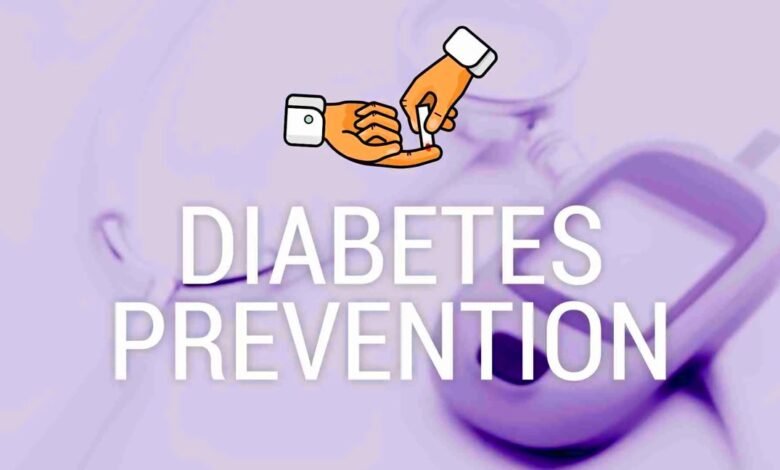Diabetes Prevention: Steps to Reduce Your Risk

“Diabetes Prevention: Steps to Reduce Your Risk” provides valuable insights into the practical strategies and lifestyle changes you can implement to lower your chances of developing diabetes. Explore this comprehensive guide to learn how to make informed choices and take proactive measures toward a healthier life. Discover actionable steps that empower you to mitigate the risk factors associated with diabetes and improve your overall well-being.
Diabetes is a chronic health condition that affects millions of people worldwide. It occurs when your body either doesn’t produce enough insulin or cannot effectively use the insulin it produces. While there are risk factors beyond our control, such as genetics and age, there are several proactive steps you can take to reduce your risk of developing diabetes
Understanding Diabetes
To effectively prevent diabetes, it is essential to understand the disease. Diabetes is categorized into three main types: type 1 diabetes, type 2 diabetes, and gestational diabetes. Type 1 diabetes is an autoimmune condition where the body fails to produce insulin. Type 2 diabetes occurs when the body becomes resistant to insulin or doesn’t produce enough of it. Gestational diabetes develops during pregnancy and usually resolves after childbirth.
Importance of a Healthy Diet for Diabetes Prevention
A healthy diet plays a crucial role in diabetes prevention. Focus on consuming a variety of nutrient-rich foods, including fruits, vegetables, whole grains, lean proteins, and healthy fats. Avoid or limit the intake of processed foods, sugary beverages, and foods high in saturated and trans fats. Incorporating balanced meals and practicing portion control can help maintain stable blood sugar levels and reduce the risk of diabetes.
Regular Physical Activity
Engaging in regular physical activity is key to diabetes prevention. Aim for at least 150 minutes of moderate-intensity aerobic exercise per week, such as brisk walking, cycling, or swimming. Additionally, include strength training exercises twice a week to improve insulin sensitivity and overall fitness. Physical activity not only helps control weight but also lowers blood sugar levels and reduces the risk of developing diabetes.
Maintaining a Healthy Weight
Maintaining a healthy weight is essential for diabetes prevention. Excess body weight, especially around the waistline, increases the risk of developing type 2 diabetes. Combine a balanced diet with regular exercise to achieve and maintain a healthy weight. Losing even a small amount of weight can have a significant impact on reducing your risk of diabetes.
Managing Stress Levels
Chronic stress can contribute to the development of diabetes. Find healthy ways to manage stress, such as practicing relaxation techniques, engaging in hobbies, or seeking support from loved ones. Regular exercise and mindfulness activities like yoga or meditation can also help reduce stress levels and promote overall well-being.
Limiting Sugar Intake
Excessive sugar consumption can lead to weight gain and increase the risk of diabetes. Limit your intake of sugary foods and beverages, including candies, sodas, and desserts. Be mindful of hidden sugars in processed foods and opt for healthier alternatives. Gradually reduce your sugar intake and focus on natural sweeteners like fruits or stevia.
Choosing Low-Glycemic Index Foods
The glycemic index (GI) measures how carbohydrates in food affect blood sugar levels. Opting for low-GI foods helps control blood glucose levels and prevent diabetes. Include foods like whole grains, legumes, non-starchy vegetables, and lean proteins with a lower GI in your meals. These foods provide sustained energy and promote better blood sugar management.
Including Fiber-Rich Foods

Fiber plays a vital role in maintaining healthy blood sugar levels. Include plenty of fiber-rich foods in your diet, such as whole grains, fruits, vegetables, and legumes. Fiber slows down the absorption of sugar and promotes a feeling of fullness, preventing overeating. Aim for at least 25 grams of fiber per day for optimal health benefits.
Reducing Processed Food Consumption
Processed foods often contain high amounts of added sugars, unhealthy fats, and artificial ingredients. These can contribute to weight gain and increase the risk of diabetes. Minimize your intake of processed foods and choose fresh, whole foods whenever possible. Prepare meals at home using nutritious ingredients to have better control over your diet.
Moderating Alcohol Consumption
Excessive alcohol consumption can lead to weight gain, high blood pressure, and an increased risk of diabetes. If you choose to drink alcohol, do so in moderation. Limit your intake to one drink per day for women and two drinks per day for men. It’s also important to be aware of the sugar content in alcoholic beverages and opt for healthier choices like light beer or dry wine.
Quitting Smoking
Smoking is a significant risk factor for various health conditions, including diabetes. It increases insulin resistance and impairs blood circulation, making it harder to manage diabetes. Quitting smoking not only reduces your risk of developing diabetes but also improves overall health. Seek support from healthcare professionals or smoking cessation programs to help you quit successfully.
Monitoring Blood Glucose Levels
Regular monitoring of blood glucose levels can provide valuable insights into your health and help detect early signs of diabetes. If you have a family history of diabetes or other risk factors, consider periodic blood sugar testing. This proactive approach allows for timely interventions and lifestyle adjustments to prevent or manage diabetes effectively.
Regular Medical Check-ups
Routine medical check-ups are crucial for diabetes prevention. Visit your healthcare provider regularly to assess your overall health, including blood pressure, cholesterol levels, and blood sugar levels. These check-ups help identify any potential risks or early signs of diabetes, enabling timely interventions and appropriate management strategies.
Getting Sufficient Sleep
Adequate sleep is essential for maintaining optimal health and reducing the risk of diabetes. Poor sleep quality and inadequate sleep duration can disrupt hormonal balance and impair insulin sensitivity. Aim for 7-9 hours of quality sleep each night. Establish a relaxing bedtime routine and create a sleep-friendly environment to improve the quality of your sleep.
Educating Yourself and Seeking Support
Educating yourself about diabetes and seeking support is essential in preventing the disease. Stay informed about the latest research, lifestyle recommendations, and treatment options. Join support groups or seek guidance from healthcare professionals to gain valuable insights and stay motivated on your journey toward diabetes prevention.
Read More: 11 Best and Worst Diets for Diabetes
Conclusion
Taking proactive steps to prevent diabetes is crucial for maintaining optimal health and well-being. By adopting a healthy lifestyle, including a balanced diet, regular exercise, stress management, and maintaining a healthy weight, you can significantly reduce your risk of developing diabetes. Remember to monitor your blood glucose levels, attend regular check-ups, and educate yourself about diabetes to make informed decisions. Start implementing these strategies today to take control of your health and reduce the risk of diabetes.
FAQs
Can diabetes be completely prevented?
While diabetes cannot be completely prevented in all cases, adopting a healthy lifestyle can significantly reduce the risk of developing the disease. Taking proactive steps, such as maintaining a healthy weight, exercising regularly, and eating a balanced diet, can greatly lower the chances of developing diabetes.
How does physical activity help prevent diabetes?
Engaging in regular physical activity helps improve insulin sensitivity and maintain a healthy weight, reducing the risk of diabetes. Exercise also promotes overall cardiovascular health, lowers blood pressure, and improves blood sugar control.
Is it possible to reverse prediabetes?
Prediabetes is a condition where blood sugar levels are higher than normal but not high enough to be diagnosed as diabetes. With lifestyle modifications, such as weight loss, healthy eating, and regular exercise, it is possible to reverse prediabetes and prevent the progression of diabetes.
Can stress increase the risk of diabetes?
Chronic stress can contribute to the development of diabetes by affecting hormone levels and increasing insulin resistance. Managing stress through relaxation techniques, exercise, and seeking support can help reduce the risk of diabetes.
Are there any medications available for diabetes prevention?
While there are medications available for managing diabetes, there is no specific medication solely for preventing the disease. Lifestyle modifications, including diet and exercise, remain the primary approach for diabetes prevention.







